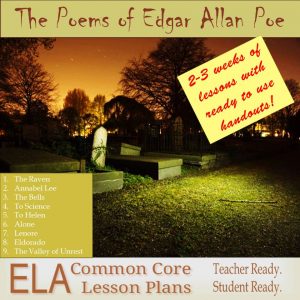Impress your friends and neighbors with your literary smarts by showing off a deep understanding of “Eldorado” by Edgar Allan Poe.
Here’s a poetry analysis lesson plan with handout for doing an “Eldorado” poetry analysis lesson: Eldorado Poem Analysis Lesson Plan.
“Eldorado” Literary Analysis Notes

I get it. You want good poetry lesson plans, but you also want to go home before midnight. These Edgar Allan Poe Poetry lesson plans provide 2-3 weeks worth of engaging lessons. No prep needed. Just print and copy.
My initial analysis produced the following observations.
- Rhyme Scheme: aabccb, except for the last stanza, xxabba-the initial rhyming couplet in each of the first three stanzas is about the knight; the fourth stanza does not begin with a rhyming couplet, for it is not about the knight. In fact, the knight dies at the end of stanza 3.
- Meter: The rhyming couplets (aa and cc) are written in iambic duometer, mimicking the clattering of horse’s hooves clattering in search of Eldorado, I presume.
- Repetition: The third line of each stanza ends with “shadow”; the last line of each stanza ends with “Eldorado.” Eldorado is a make believe city of gold; it may represent dreams; associating it with shadow, something without substance, may be a comment on what the knight has dedicated his life to.
- In the first stanza the knight (pardon this incredibly trite expression) finds joy in the journey-gaily bedighted (1) (I need to find out what in the heck bedight means (I just found out at onlinedictionary.com) that it means to decorate or dress). The word bedight is a Middle English word, which makes sense since knights lived in the Middle Ages. This, my friends, is one helluva gaily decorated, armored man.
- In the second stanza, the knight is old and not quite as gay. He has yet to find his land of enchantment.
- In the third stanza, the knight dies, finds a “pilgrim shadow” and asks him where to find Eldorado. Do you see, children, just how good we have it. This poor knight did not have Mapquest, GPS, or even a cell phone to find out where this place was.
- In the fourth stanza, this shade seems like a nice fellow. He encourages the knight to continue seeking his elusive destination.
- The connotation of shadow changes as the poem progresses. In stanza one it’s associated with riding through the countryside, alternating from shadow to sun; in stanza two, shadow figuratively covers the knight’s heart; in the third stanza, the shadow is a spirit; in the fourth stanza it is used as “Valley of the Shadow,” a euphemism for death.
“Eldorado” Analysis Paragraph

Imagine having 11 complete poetry units with handouts and lesson plans completed. You don’t need to imagine. These units are teacher ready and student ready. Just print, make copies, and accept accolades from colleagues and students.
It’s funny. I never really liked this poem, but after doing an analysis of “Eldorado” by Edgar Allan Poe, I really like it. I’m sorry I ever doubted Edgar. Eddie, if you return from the dead, let not this past dislike of a great poem create a desire in your dead heart to plant an ax in my skull. Here’s my sample analysis paragraph.
In Edgar Allan Poe’s “Eldorado,” the knight, as well as the reader, is encouraged to find joy in the journey, because just like the mythical city of gold which shares its name with the poem, dreams often prove to be elusive, like a shadow. The poem begins “Gaily bedight / A gallant knight” (1-2), and why is this knight so gaily dressed? And why is this knight singing a song? It is because he is on a quest. He has not found anything, has not achieved anything. It’s the quest that brings him happiness, that causes him to dress gaily and sing songs. The knight fails to understand the cause of his happiness. He laments his failure, never having found Eldorado. He does not fail, however, to continue searching. The first thing he asks after “his strength / Failed him at length” (13-14) is “Where can it be / This land of Eldorado?” The shade doesn’t take him there, of course; he simply tells him to “Ride, boldly ride,” for that is Eldorado.
*A simpler analysis of “Eldorado” by Edgar Allan Poe: Eldorado is just a symbolic name for eternal life, something unattainable on Earth, only attainable to those who die-who go “Down the Valley of the Shadow.”
“Eldorado” by Edgar Allan Poe
A gallant knight,
In sunshine and in shadow,
Had journeyed long,
Singing a song,
In search of Eldorado.
This knight so bold-
And o’er his heart a shadow
Fell as he found
No spot of ground
That looked like Eldorado.
And, as his strength
Failed him at length,
He met a pilgrim shadow-
“Shadow,” said he,
“Where can it be-
This land of Eldorado?”
“Over the Mountains
Of the Moon,
Down the Valley of the Shadow,
Ride, boldly ride,”
The shade replied-
“If you seek for Eldorado!”
